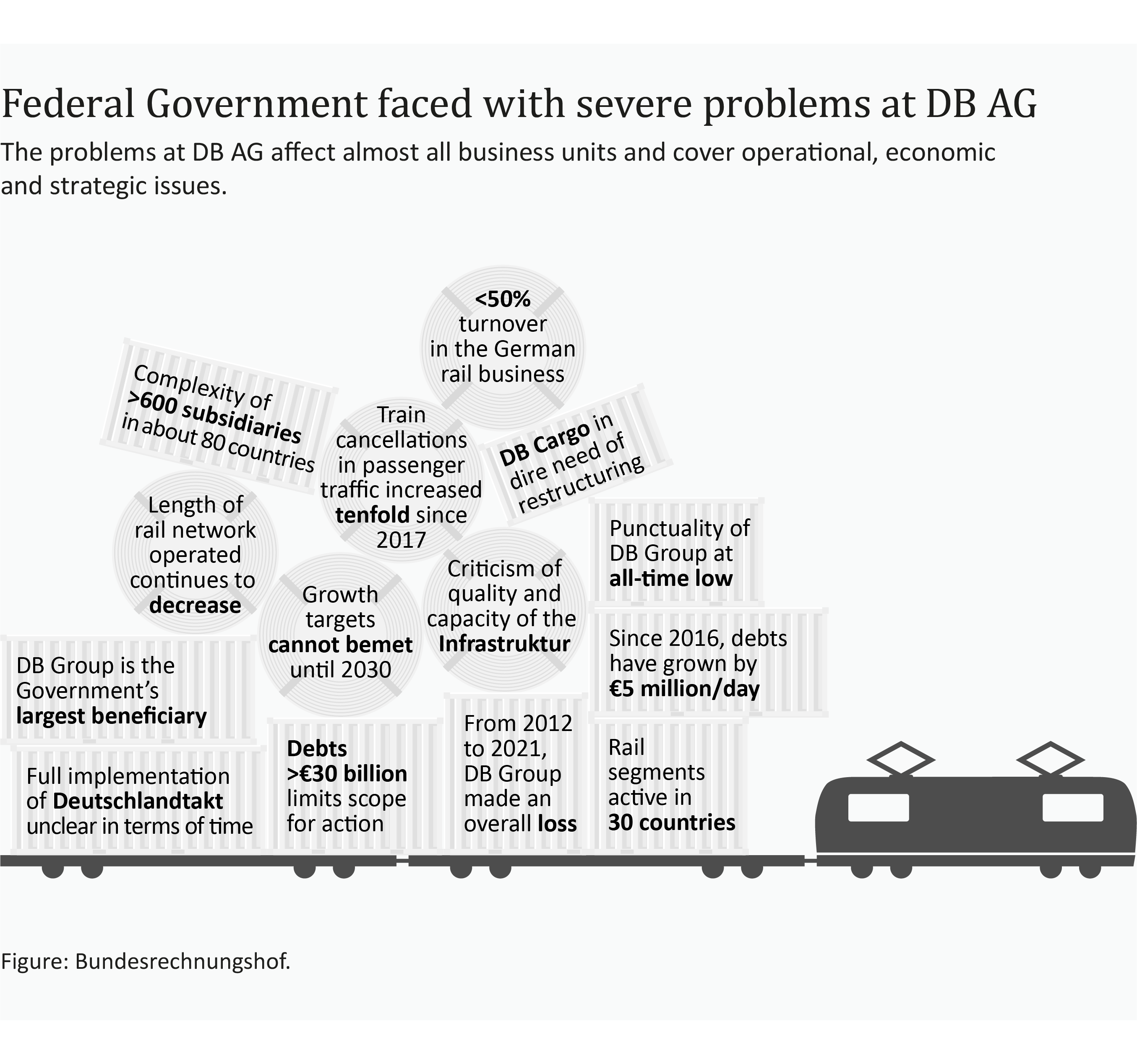Deutsche Bahn: Reform fundamentally and end permanent crisis!

Date 2023.03.15
Deutsche Bahn AG (DB AG) has faced more and more problems. Its situation has steadily deteriorated within the last years – DB AG does not meet customer requirements in terms of punctuality and reliability. In 2022, more than every third long-distance train was delayed. For decades, other traffic has also not been transferred to rail to a significant extent. In a current special purpose report, we identify shortcomings and demand that the Federal Government take decisive action.
In 2019, we published a special purpose report identifying numerous shortcomings at DB AG. DB AG and the Federal Government as its shareholder are currently facing severe structural, financial and operational problems. Rail infrastructure is outdated. In 2022, more than every third long-distance train was also delayed. The profits in rail-related business units are declining. Some of these units even suffer huge losses. This results in the economic situation of DB AG becoming increasingly severe.

Not least because of this large number of problems, the Federal Government needs to increasingly provide financial support to DB AG. Nevertheless, DB Group’s debts have grown by €5 million a day since 2016. As a result, DB AG has accumulated debts of more than €30 billion since then. At the same time, the Management Board of DB AG has asked for more and more money from the federal budget. DB AG is becoming a bottomless pit of money.
Federal Government needs to take decisive action in steering DB AG
DB AG is not solely responsible for the permanent crisis. The Federal Government has further aggravated the problems because of own shortcomings:
- The Federal Government has not clearly defined the content of its rail policy objectives. The Government has not stated “what kind of railways” and “how much railways” it intends to have in the future and “at what cost”.
- The Federal Government still lacks a convincing ownership strategy. The Government does not manage to align the business activities of DB AG with the interests of the Government. DB AG uses this shortcoming and continues to expand international and non-railway activities.
- The Federal Government has so far not taken action to change the integrated group structure of DB AG. The Government accepts both obstacles to exert influence and to increase competition in the rail sector.
- The new steering group in the Federal Ministry for Digital and Transport announced in June 2022 does not increase the ability to exert influence over DB AG under company law as required – the Government’s long-term lack of control over the DB Group may continue as before.
The envisaged focus in the “Strong Rail” strategy or the “nationwide integrated regular interval timetable” which has temporally gotten out of hand are just empty phrases – like many other solutions which have been announced.
Fundamental reforms are required to ensure that the railway system is able to meet its transport and climate policy role."
Federal Government must finally take action
The German Constitution stipulates that the Federal Government has to ensure that railway infrastructure and rail transport services that meet the transport needs are provided for the common good. The permanent crisis of DB AG, however, jeopardises this mission of the Government. Therefore, the Government needs to take action to keep its promises and to refocus the activities of DB AG in an effective, comprehensive and prompt manner:
- In an overall approach, the Federal Government needs to develop clear objectives for the railway system to substantiate the constitutional mandate.
- The Federal Government needs to develop the ownership strategy which has been announced for a long time – in particular, the Government has to define what parts of the DB Group still have to be owned by the Government in the future to be able to meet its constitutional mandate.
- The Federal Government needs to further develop the structure of the railway system. This includes the control over an efficient rail network. The Government should encourage competition in the rail sector – own railway companies are not necessarily needed for this purpose.
- In favour of active shareholding management, the Federal Government needs to ensure that it may exert influence appropriately. This requires an effective steering group in the Federal Ministry for Digital and Transport that takes account of the Government’s role as sole shareholder.
